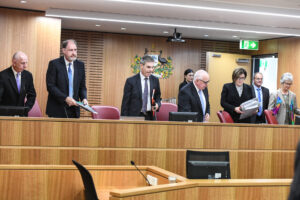Despite unemployment at nearly 50 years lows, it will be little surprise to workers that wages growth is only at 3 year highs. Over the past decade the relationship between wages growth and unemployment has shifted such that levels of unemployment that would have once seen wages growing at more than 4% are now associated with growth of well below 3%.
This has not happened by accident or some “invisible hand” of the free market. Decades of industrial relations legislation has purposefully reduced the ability for workers to organise and bargain for better wages.
Labour market policy director, Greg Jericho writes in Guardian Australia that we are now also seeing for the first time a shift in the relationship between wages and underutilisation.
These changes have meant that employees are receiving ever smaller slices of the national income pie.
The past 24 years have also displayed that theory of increasing productivity resulting in better wages, works better in the economic textbook than reality. In just 7 of those 24 years, have real wages outgrown productivity – and 4 of those year were because of highly unusual cases of productivity actually declining.
The Job Summit in September needs to be a time for a reset – a time to acknowledge that the labour market is not fairly weighted and that workers are not getting their fair share.

You might also like
The continuing irrelevance of minimum wages to future inflation
Minimum and award wages should grow by 5 to 9 per cent this year
Dutton’s nuclear push will cost renewable jobs
Dutton’s nuclear push will cost renewable jobs As Australia’s federal election campaign has finally begun, opposition leader Peter Dutton’s proposal to spend hundreds of billions in public money to build seven nuclear power plants across the country has been carefully scrutinized. The technological unfeasibility, staggering cost, and scant detail of the Coalition’s nuclear proposal have
Want to lift workers’ productivity? Let’s start with their bosses
Business representatives sit down today with government and others to talk about productivity. Who, according to those business representatives, will need to change the way they do things?



